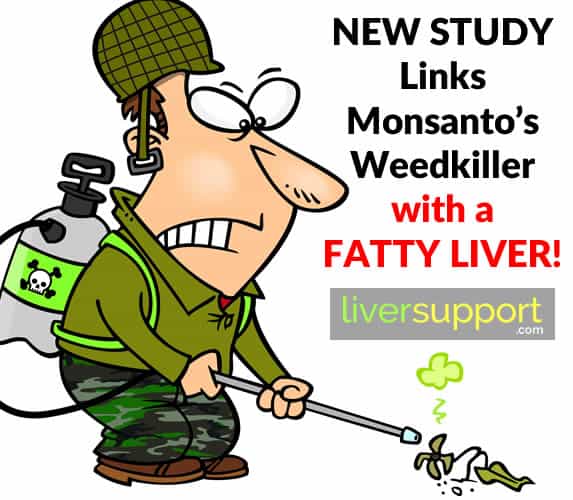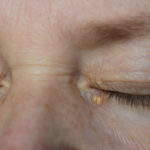
Previous
Damage to Your Liver With Just ONE Cheeseburger

Next
Spring Is the Ideal Time to Clean Your Liver
New Study Links Monsanto’s Weedkiller With a Fatty Liver
New evidence connects glyphosphate, an active ingredient in RoundUp, to liver damage. This demonstrates that modern agricultural practices are now a major factor in our society’s increase in chronic liver disease.
Escalating the call to support liver health, a study published in January 2017 draws a parallel between glyphosphate consumption and fatty liver disease. The new evidence linking this chemical to liver damage highlights modern agricultural practices as a major factor in our society’s increase in chronic liver disease.
Glyphosphate Controversy
Many recognize glyphosphate as the active ingredient in Monsanto’s weedkiller, RoundUp. Despite being around since the mid-70s, we are just beginning to scratch the surface of glyphosphate’s repercussions to human health. There has been some debate as to glyphosphate’s classification as a carcinogen and whether or not it is safe:
- A 1990s ruling of a New York court forbade Monsanto from describing RoundUp as safe, non-toxic and harmless.
- The U.S. Environmental Protection Agency (EPA) has not outlawed Roundup, because they claim that when used according to the instructions, glyphosate has a low level of toxicity.
- In March 2015, the World Health Organization’s International Agency for Research on Cancer (IARC) concluded that glyphosate is a “probable human carcinogen.”
- The United Nation’s Food and Agriculture Organization (FAO) responded to IARC by claiming glyphosphate is “unlikely to pose a carcinogenic risk to humans from exposure through the diet.”
The New Glyphosphate Study
Led by Dr. Michael Antoniou at King’s College London, the peer-reviewed study was published in the January 2017 edition of the journal Nature. By administering a very low daily dose of glyphosphate to rats over the course of two years, this study was the first to demonstrate a causative relationship between an environmentally relevant level of RoundUp consumption over the long-term and non-alcoholic fatty liver disease.
Pertinent study details include:
- In their drinking water, female rats were fed 4 nanograms of glyphosphate per kilogram of body weight per day for two years.
- This glyphosphate quantity is 75,000 times below EU and 437,500 below U.S. permitted levels.
- According to research associate Dr. Robin Mesnage, the concentration of glyphosate that was used corresponds to the concentration found in tap water considered safe for human consumption – a concentration that is far lower than glyphosphate contamination in food.
- According to Antoniou, previous studies on human urine found that we often consume around a thousand times the amount of glyphosate the studied rats consumed.
- The rats had metabolome and proteome disturbances in their liver, correlating with non-alcoholic fatty liver disease and its progression to steatohepatosis.
- The disturbances noted by researchers mean that consumption of low doses of glyphosate over time can cause cell damage, serious fatty liver disease, and areas of dead tissue in the liver.
Glyphosphate in Our Food
A synthetic amino acid, glyphosphate is the most widely used weedkiller on the planet – and its presence in food for human consumption and animal feed is omnipresent. A harmful practice that fosters glyphosphate existence in our food is pre-harvest treatment. In northern, colder regions farmers must wait for their crops to dry out prior to harvest. Instead of waiting an additional two to three weeks for drying out, farmers frequently spray their plants with glyphosate, killing the crop and accelerating their drying. This is known as desiccating.
Crops that are commonly desiccated with glyphosphate include:
- Wheat
- Barley
- Oats
- Lentils
- Corn
- Peas
- Flax
- Rye
- Buckwheat
- Millet
- Sunflowers
- Potatoes
- Canola
- Sugar beets
- Triticale
- Non-GMO soybeans
After desiccation, the likelihood of glyphosphate residual is high. Recent testing by the Defra Committee on Pesticide Residues in Food (PRiF) found that almost two-thirds of whole-meal bread sampled contained glyphosate. Testing for glyphosate residue at a U.S. Food and Drug Administration laboratory in Atlanta has found up to 1.67 parts per million (ppm) in certain instant oatmeal cereals and up to 121 nanograms per gram (ng/g) in samples of honey.
Liver Protection
Barring growing your own food, it seems hard to avoid glyphosphate food contamination. Those at higher risk for fatty liver disease (individuals who are overweight, obese, or have diabetes, high cholesterol and high triglycerides) are particularly vulnerable to the effects of this weedkiller.
Advocates of shielding your liver from environmental toxins advise supporting the liver with natural substances that:
- prevent fat accumulation in the liver
- support liver cell health
- reduce liver inflammation
- improve the body’s utilization of glucose
- aid in liver detoxification
In addition to eating a nutritious diet, exercising regularly and avoiding as many environmental toxins as possible, combining these five liver support goals helps to combat chemical-induced liver problems. To reduce the cumulative effect glyphosphate has already taken and will continue to exert on your liver, a comprehensive supplement like Clinical LiverSupport provides all of the suggested liver protection benefits.
Hopefully, the King’s College London study will be a turning point in how the agricultural and health industries consider one another. To be healthy, we need nutritious and chemical-free food. Especially when it comes to non-alcoholic fatty liver disease and steatohepatitis, phasing glyphosphate out of agriculture (especially desiccation) appears to be the next step. Until that happens, please, protect your liver from this popular weedkiller and desiccant.
Editor’s Note: Read more about RoundUp and its negative impact on chronic liver disease.
http://articles.mercola.com/sites/articles/archive/2016/05/03/glyphosate-food.aspx, Many Surprising Foods Found to Contain Monsanto’s Deadly Poison, Dr. Mercola, Retrieved January 29, 2017, Dr. Joseph Mercola, 2017.
http://www.caribbean360.com/news/weedkiller-commonly-used-caribbean-linked-potentially-fatal-liver-disease, Weedkiller Commonly Used in Caribbean Linked to Potentially Fatal Liver Disease, Retrieved January 20, 2017, Caribbean360, 2017.
http://www.foodsafetynews.com/2016/10/fda-testing-finds-weed-killer-residue-in-honey-instant-oatmeal/#.WI6QIbGZMdU, FDA testing finds weed killer residue in honey, instant oatmeal, Cathy Siegner, Retrieved January 29, 2017, Marier Clark, 2017.
http://www.liversupport.com/can-a-healthy-lawn-and-a-healthy-liver-co-exist/, Can a Healthy Lawn and a Healthy Liver Co-Exist?, Nicole Cutler, Retrieved January 29, 2017, Natural Wellness, 2017.
http://www.nature.com/articles/srep39328, Multiomics reveal non-alcoholic fatty liver disease in rats following chronic exposure to an ultra-low dose of Roundup herbicide, R. Mesnage, et al, Retrieved January 29, 2017, Nature, January 2017.
https://www.researchgate.net/publication/305318376_Glyphosate_pathways_to_modern_diseases_V_Amino_acid_analogue_of_glycine_in_diverse_proteins, Glyphosate pathways to modern diseases V: Amino acid analogue of glycine in diverse proteins, A Samsel, S Seneff, Retrieved January 20, 2017, Journal of Biological Physics and Chemistry, June 2016.
https://www.soilassociation.org/blogs/2017/january/glyphosate-weedkiller-causes-liver-disease/, Glyphosate Causes Liver Disease, Peter Melchett, Retrieved January 20, 2017, Soil Association, 2017.










